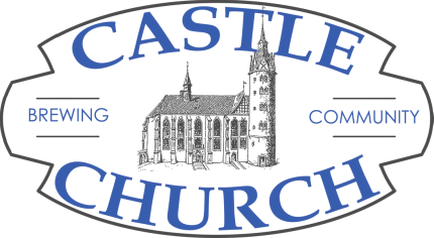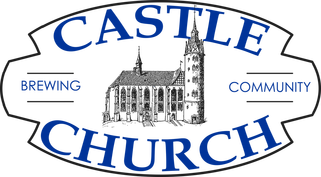|
Evelyn MacDougall - June 28, 2018 I snored so loudly that I woke myself up.
Drool was actively falling onto my neck-pillow while on a bus passing through where the Alps jut across the meeting of Switzerland, Liechtenstein, and Austria’s borders. Cliffs and icy mountain tops softened to bright blue rivers and lush meadows – all thriving in the shadow of the summer solstice. I wondered to which languages the cows and goats would respond. In the presence of such immense natural beauty, my drool wasn’t exactly what I wanted my seatmates or I to experience. However, I wouldn’t trade that puddle for the encounter I’d had the night before which I already exchanged for sleep. And I refuse to apologize for missing a couple hours of views on my seven hour bus ride. Today is a big milestone in Castle Church’s young history. After dozens of sleepless nights, hundreds of prayers, and thousands of words of support and encouragement from family and friends, today, we
Castle Church Community Development Team l November 19, 2017 Castle Church has broke ground on its permanent digs—an 11,500 SQFT production scale brewery and taproom—set to open in early 2018. But the church is the people and we’re tired of waiting, so we’re setting up a biergarten communion group right on site as the building is going up. We’ll actually get to watch the building and the community “growing up together,” week by week, as the physical space we’ve been dreaming of, and so many of you have supported, becomes a reality. Everyone is invited. Literally. This isn’t a bait ‘n’ switch. If you are made of some kind of tangible matter and take up physical space, you are welcome at our table. Jared Witt l August 17, 2017 In ancient days, there existed a certain category of person who just isn't around anymore. All societies had them, and they went by many names. But we’ll just call them the wise people. Much of their “knowledge” was unsurprisingly folksy. But often times their charlatanism in one sphere was paired side by side with another in which they were as disciplined as any modern academic, albeit with access to far less source material. Specifically, the discrepancy in their expertise generally (though not always) ran along the same line that separates what we call “the humanities” and what we call “the sciences” in our universities. So the same person who prescribed quack herbal remedies for headaches, which we know today to be unhelpul, might also have had complete mastery over six different languages and all of the major literature in each. The person who claimed to read the future based on the stars might also have discovered a brilliant geometric formula. Jared Witt l October 27, 2016 If you actually did all of the English homework from high school on up (and you know who you are, if you didn’t), the chances are that you’ve read several books that were first penned in a Parisian café. All the other romantic hearts out there will understand, it is a breathtaking experience, walking trough the alleyways of the Latin Quarter and knowing that generations of luminaries from Voltaire to Oscar Wilde sipped, smoked, and scribbled their classics in these very spots. Geniuses are born all over the world. Most die in obscurity. It can’t be an accident that such a confluence of enduring ideas came from a few square blocks along the Seine nor that so many Americans, Brits and other non-natives felt that this was the appropriate place to launch their writing careers. Joy is not an easy thing to quantify. It cannot be easily manufactured, like entertainment can be. It’s more elusive than levity or amusement. It runs deeper than pleasure. And where mirth is a sort of self-forgetfulness, joy involves something like the opposite: fullness of presence and mindfulness. Many successful comedians can tell you how they’ve gone through long periods of frequent laughter but little joy. And most of us know that person who seems to have accessed some bottomless well of joy, regardless of what troubles occur in their lives. In my experience, joy always involves meaningful relationship with others in some way. This is true even of the individual pursuits that bring me joy. I find joy in gardening, because it reminds me of my mother and my grandmother. Going on a hike alone gives me time to reflect on the relationships and experiences that matter most to me. Joy is never solitary, even if I am. Maybe that’s one reason why it can’t be manufactured. At the end of a long work week, I tend to seek out levity, entertainment, distraction. The activities that promise these things tend to require little forethought. They tend to be easy come, easy go. That’s what appeals to me about them when I’m over worked. The flipside, of course, is that they have almost no lasting effect on me. They leave me no better than they found me. As a person who is trying to live faithfully, I experience a big difference between finding genuine Sabbath restfulness on the weekend and simply collapsing from exhaustion. It takes almost no investment of energy to plan a weekend of Netflix, frozen pizza, and mindless social media scanning, compared to the energy it takes to seek out a group of friends, figure out a place and time to meet them, and make real conversation when we get there. So for a tired introvert, there is no comparison, which alternative is more attractive on the front end. But the feeling I get after a Netflix marathon is as far away from joy as Busch Light is from a wee heavy Scotch ale. The term “recreation” (re-creation) probably came into popular usage around the 13th century, somewhere between Latin and modern day French. Back then, the term carried a much stronger weight than mindless entertainment (because there wasn’t a whole lot of mindless entertainment back then). It probably meant, much more literally than it does today: to make new, to make alive, or to make vital again. It’s actually deeply spiritual, biblical even, to be “working for the weekend,” with the caveat—which the band, Loverboy, failed to mention—that the weekend is spent genuinely re-creating and resting as opposed to going comatose. When I spend my weekend watching Netflix and eating frozen pizzas, I can say that I’ve been entertained, I’ve eased off, I’ve reposed, but I don’t think that I can say I’ve been made alive or made new in any significant way. On the front end, it takes more energy and planning to gather a group of real (as opposed to digital) friends together, to commit to a time and place, and to actually contribute something to a conversation (as opposed to just consuming the script of a TV writer). But on the back end, there is an incomparably bigger payoff in terms of the re-creation of my soul. The laughter is shared laughter, as opposed to the one directional guffaws that I might direct at Kimmy Schmidt on a screen. The experiences leave a lasting impression, rather than just leading right into the countdown to the next episode. When we’re actually with the people whom we care about, we sometimes say that we’re “creating memories.” It might be more challenging to actually make time for them than it is to just keep up with their Instagram feed. But, then, no one ever refers to their time scanning an Instagram feed as time spent “creating memories.” It’s like we know, subconsciously, in the way that we use language, that certain pastimes are not so re-creational. The challenge we’re taking on at Castle Church is the challenge of facilitating real connectedness in our community—of creating a “third place” where meaningful relationships happen. For nearly all of recorded history, wherever there was great beer, people would gather and get to know each other better. Where people get together, free of other demands and distractions, they have an uncanny ability to start re-creating. And that almost always results in joy. - Jared |
Mashing in.On how Castle Church is stirring up a movement from a brewery in Florida. Archives
July 2018
|
Curated selection
- UK Online Casinos Not On Gamstop
- UK Online Casinos Not On Gamstop
- Casino Sites Not On Gamstop
- Best Non Gamstop Casinos UK 2025
- Casino Sites Not On Gamstop
- UK Online Casinos Not On Gamstop
- Non Gamstop Casinos UK
- Non Gamstop Casino Sites UK
- UK Casino Not On Gamstop
- Best Non Gamstop Casinos
- Online Casinos
- UK Casino Not On Gamstop
- Non Gamstop Casino
- Gambling Sites Not On Gamstop
- Migliore Casino Non Aams
- List Of UK Casino Sites
- UK Casinos Not On Gamstop
- Gambling Sites Not On Gamstop
- Best Non Gamstop Casinos
- Casino Not On Gamstop
- Betting Sites
- Non Aams Casino
- Migliori Siti Casino Non Aams
- Non Gamstop Casino
- Casino En Ligne
- Bitcoin Casinos
- Meilleur Site Casino En Ligne Belgique
- Meilleur Casino En Ligne Avis
- Site De Paris Sportif Bonus
- Paris Sportif Ufc Mma
- Siti Di Casino Online 2026
- Meilleur Casino En Ligne
- Casino En Ligne
- 50 Free Spin Senza Deposito
- Migliori Casino Online
- Meilleur Casino En Ligne France
- Nuovi Casino Non Aams
- Nouveau Casino En Ligne France
- Migliori Siti Casino Online
- Trusted Online Casino Malaysia

 RSS Feed
RSS Feed




